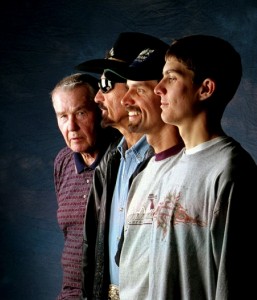 In the current job market, there are four different generations working, the first time in American history that this is the case. Each generation has a different way of communicating and different values and expectations.
In the current job market, there are four different generations working, the first time in American history that this is the case. Each generation has a different way of communicating and different values and expectations.
According to Greg Hammill, a human resources specialist, there are distinct attitudes, motivational “buttons,” behaviors, habits and expectations identified within each generational group. Research has revealed that individuals communicate based on their generational background. Generational differences can affect hiring, the building of teams, motivating and managing people and, ultimately, increasing productivity. Generational differences can also result in misunderstandings, employee turnover, problems in attracting good employees and keeping employees loyal. Learning how to communicate with the different groups can eliminate a great deal of confrontations and misunderstandings in the workplace. Follow past the jump for profiles of the four generations sharing the modern workplace.
Some of the characteristics of the four generations as described by experts in the field, including Greg Hammill, are included in the breakdown over the fold:
Veterans, Traditionalists: 1922-1945 – value hard work, respect authority, believe in “duty before fun,” work individually, desire specific requests for work to be done, look for handwritten notes
Baby Boomers: 1946-1964 – workaholic, competitive, feel that workers should “pay their dues,” crusaders for causes, question authority, team players, curious, goal oriented, loyal, you can call them “day and night”
Gen Xers: 1965-1980 – improve efficiency, ambitious, inventive, individualistic, optimistic, skeptical, independent, resourceful, challenge others, able to balance work and family, technologically adept, adapt well to change, eager to learn new skills, celebrate diversity
Gen Yers: 1981-2000 – tolerant, goal oriented, multi-tasking, participative, seek meaningful work with other bright, creative people, like teamwork, feedback and technology, do not want any meetings at all, only communicate via email and voice mail
To demonstrate how one’s generation makes a difference, Hammill suggests that we think about how someone from each generation might respond when asked to recall where they were when Kennedy died. Veterans and Baby Boomers might say, “Gunshots in Dallas, Texas.” Gen Xers might recall an airplane crash near Martha’s Vineyard. Gen Yers might even say, “Kennedy? Kennedy who?”
Good business is based on understanding others. Along with problems in the workplace that are the result of global competition, downsizing, greed, etc., are the problems inherent in generations colliding. A good manager is aware of generational differences and can help individuals modify their message for maximal effect, no matter what the task may be.
Many of us think that the only way, the right way, is our way which, of course, is not true. In business – as well as in our personal life – one needs to understand generational characteristics and how to use them correctly in dealing with each person as an individual, keeping an open mind to alternative opinions and ideas.
To begin to understand how different people act and react, we must first begin with understanding ourselves. Take a moment to identify which generational category you fit into and then see if you can identify generational characteristics of others in your workplace or family and see if you have a better understanding of them, now that you know about generational differences.

I ft into the generational category of Baby Boomers 1946-1964 (the tail end of ‘62!), however I have worked with and have family that fall into: Veterans, Gen Xers, and Gen Yers. In an understanding of how each generation thrives it’s important to understand that previous generations had an effect on future generations. We have relied on the road our “forefather’s” have paved, and each generation brings to the proverbial business table not only what is learned, but be willing to accept change.
I learned my work ethics from my grandparents and parents way before entering into the workforce. I learned this by example just as my children learned from me. Work ethics should be a constant in an ever changing technological world not a generational difference. What we can count on is change and advancement! My feeling is a good manager is aware of generational differences, but a great manager explains the “why” instead of just the “how.” Each generation offers knowledge, creativity, and communication; a great manager should embrace the skills and talent of each employee regardless of age, and offer a willingness to broaden the capability of each. It’s imperative for employees to feel they are a part of a collaborative effort, and the understanding of “why” aids in the “buy in” of the employee. Even veterans/traditionalists though often worked individually “bought into” the desire to be part of a team/country in which they believed.
Thanks Anthony, I enjoyed responding to this blog. Your writing is motivational!
Donna, my apology. I enjoyed reading your blog! Oh my gosh, I guess this really does tell my age. I enjoy posts by both you and Anthony!
Big smile for you Gia, from a fellow Baby Boomer who feels that having your regular voice in the comments represents all Baby Boomers at the highest level! Keep them “cards and letters” comin’ in, dear friend! We love when you contribute!